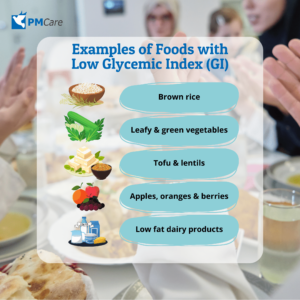Addressing Health Concerns While Fasting
It’s that time of the year again!
The blessed month of Ramadhan 1445H is knocking on our doors soon. The month where we fast, as part of our obligation as a Muslim, also as part of our solidarity for the less fortunate who barely have food on the table, roof above their head, clothes on their back.

However, Ramadhan can be a challenging period for some – e.g. diabetic patients, pregnant mothers, breastfeeding mothers, patients with chronic debilitating illness, etc. These group of people need special attention to successfully, safely and healthily get through the fasting month.
Fasting For Diabetic People
Being diabetic is not a life sentence. A diabetic patient can still fast, with proper preparation, monitoring and guidelines.
If you have diabetes and are fasting, it is highly advisable to get food with low glycemic index (GI) for slower digestion and absorption, thus preventing the spike and crash of blood sugar level. This can help to prevent hypoglycemia episodes or low blood sugar level, which can be life threatening.
Examples of food with low GI:
- Brown Rice
- Leafy & green vegetables
- Tofu and lentils
- Apples, oranges & berries
- Low fat dairy products

Here are some ways to plan and monitor your fasting journey if you have diabetes:
- Plan your meal during suhoor.
- Check your blood sugar level regularly.
- Consult your preferred medical provider if you think you need to adjust your diabetic medications dosage.
- Be aware of warning signs of low blood sugar level.
Fasting While Pregnant or Breastfeeding
Pregnant and breastfeeding mothers require more nutrients, more energy sources and a balanced diet for the wellbeing of the mother herself, the precious pregnancy the mothers are carrying, as well as the babies the mothers are breastfeeding.
Though Islam in its beauty permits pregnant and breastfeeding mothers to not observe their fasting for the safety of themselves as well as the babies they are carrying or breastfeeding, it is not totally against the teaching should they decide to observe the fasting month like other believers.

A proper nutrient watch, balanced suhoor meal and healthy iftar preparation can really help pregnant and breastfeeding mothers to carry on with their fasting without compromising their health, as well as the safety of the babies they are carrying or breastfeeding. Don’t forget to drink extra fluids to stay hydrated throughout fasting!
Of course, the fasting experience might be different for every mother – hence, talk to your doctor to plan out a more comprehensive diet guide.
Fasting for the Sick and Unwell
The sick and unwell are among the other group of believers that has been given handicap and permission to not observe their fasting. Post-operative patients will require the best round-the-clock nutrients to heal better, quicker and properly.
It is advisable for the sick and unwell to not observe their fasting if it can compromise their health, which is one of the most important aspects of the faith – to preserve the health and life.
All in all, Ramadhan is the month of devotion, month of purification and spiritual rejuvenation. It might as well be the month of physical cleanse, month of healthier habits and month of blessings, spiritually and physically.
May the fasting and noble deeds undertaken during this blessed month find favour and acceptance in the eyes of The Almighty, bringing abundance of blessings and spiritual fulfillment.
Salam Ramadan 2024 to all Muslims!

